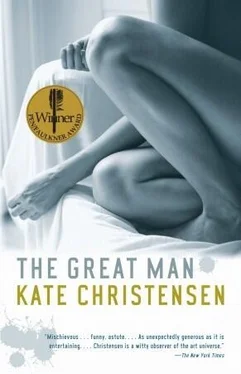“And do you think,” Ralph asked, the words surging forth as if they’d been dammed up for years in his head and were finally being released into the air, “that the reason he’s not as famous as he should be is that he refused to ‘join the gang,’ so to speak? He didn’t hobnob at the White Horse or the Cedar Tavern. He didn’t go to their openings. He deliberately spurned their dealers and gallery owners. Clement Greenberg had a vendetta against him, and he didn’t seem to care. He essentially sat out the dance after the abstract expressionists’ big party.”
“You’re certainly obsessed with this so-called isolation. Oscar had a party of his own; who needed theirs?”
“That’s true,” said Ralph. “And now there’s Lucien Freud and John Currin to prove it. Tell me Oscar didn’t influence them both tremendously.”
“Lucien Freud. Lucien Freud. Oscar couldn’t wrap his mind around how that man avoided becoming a laughingstock. And he said he wouldn’t touch one of John Currin’s menopausal drones and booby freaks with a cattle prod. He called him ‘the modern-day Antonio Villapardo.’”
“I’m not familiar with that name,” said Ralph bemusedly, writing it down in his notebook to look up later.
“Exactly my point. That’s what Oscar said people will say about Currin in a little while.”
“Was he a Renaissance Florentine?” Ralph asked. “I thought I knew them all.”
Teddy chewed an olive, shaking her head: Antonio Villapardo was Oscar’s made-up scapegoat. This was her little private revenge on Ralph for talking about Oscar as if he were a maladjusted stick-in-the-mud. And for his stiff, academic diction, which had annoyed her since he’d arrived. She would have bet anything it was his adult overcompensation for having grown up a very bright but underprivileged and probably fatherless black kid uncomfortably out of place in the ghetto, then just as uncomfortably out of place at Harvard or wherever he’d gone to school on full scholarship. Actually, he struck Teddy as someone who wouldn’t ever feel comfortable anywhere, and this made her more sympathetic to him, but it was too late to tell him the truth about Villapardo.
“In fact,” she said instead, “toward the end of his life, when he had softened slightly, but only slightly, Oscar said he thought the only one around here with any balls was a girl, Cecily Brown. He thought she had a real knowledge of how to paint bodies, and technical mastery. But he also believed that a woman couldn’t really paint another woman. She’s too close to her subject. He thought only a man could paint a woman with the proper sense of awe, lust, the sense of otherness, the necessary distance.”
“I see,” said Ralph with a dubious look at Teddy through his rather long eyelashes. He had eyes like a deer’s, far apart, elongated. Yet there was nothing deerlike about him. The animal he most resembled, to Teddy, was a dog: a hungry jaw full of strong teeth camouflaged by a domesticated, eager-to-please smile. Was that a racist thought? she wondered, then ceased to worry about it.
“I take it you’re already familiar with Oscar’s views on the subject of his fellow painters,” she said, “and you disagree with them.”
“Frankly,” said Ralph. “I disagree with him on many points. It doesn’t in any way lessen my reverence for his work.”
“No doubt you think de Kooning is a great painter,” Teddy said.
“Guilty as charged.”
“You’ll be taken out in the yard and kneecapped later,” said Teddy. “I’m an excellent shot.”
Ralph laughed with his whole head and torso, as if this were very funny.
She disliked overlaughter; it always irked her. “Actually,” she said, “I disagreed with him for years about de Kooning and Pollock and much more. All my arguments never made a dent in his convictions.”
“Of course not,” said Ralph with an echo of fulsome laughter in his voice.
Not sure whether he was implying that Oscar was a stubborn old wing nut of a goat or that she was an uneducated nonartist unworthy of influencing a great painter, or both, Teddy smiled a secret smile and took a bite of her lentil soup. Limited access to the best ingredients, she thought, was a real test of any cook’s mettle. This soup was rich and complex and full of umami, the meatiness and soul that undergirded all the other flavors, sweetness, sourness, bitterness, saltiness. The lentils had a satisfyingly mealy give between the teeth. A suggestion of cardamom in the broth hinted at duskiness. She had added the artichoke hearts because they had an enzyme that made everything taste sweeter, a different quality of sweetness from sugar, hitting a different part of the tongue. She had added the lamb sausage because it was so good.
The doorbell rang. Teddy got up and went to the front door. Peering through the peephole, she saw Ruby.
“Well,” said Teddy, opening the door, “you’re just in time to meet your father’s biographer. He’s in full interview mode.”
Ruby kissed Teddy on her cheek, and Teddy put a hand against Ruby’s cheek as she did so. It was their familiar, affectionate greeting. Teddy didn’t sense any coolness in Ruby’s manner, but she felt wary about expecting too much affection from her. She stood back and looked at her dauntingly voluptuous, nearly forty-year-old daughter. Ruby’s face was wide and very pale; her mouth was red and full, and her naturally thick eyebrows had been plucked into fine arches over her smoky, slanted blue eyes, Oscar’s Slavic eyes, black-lashed, heavy-lidded. Her dark curly hair was piled on her head. She looked so much like Oscar…and she was so young still…. It was very complicated, being such a mother of such a daughter. Ruby’s nonidentical twin sister, Samantha, resembled Teddy; she was slinky and catlike, delicate and sensitive, whereas Ruby and Oscar were robust and sensual, blunt and unselfconscious. Because they were so much alike, mothering Samantha had been so easy, whereas Ruby, who loved her father more, had always been a challenge.
“We’ve been discussing the female form,” Teddy said.
Ruby laughed. “What else?” she said. “Well, let’s go in and offer our opinions and see where that gets us.”
Ruby put her arm through Teddy’s as they headed for the dining room. But Teddy couldn’t fully give in to her warmth. She felt that somewhere, very early probably, she had lost Ruby, and she had never been sure how to win her back. This made her act overly sensitive and cautious with Ruby, and also caused her to think critical thoughts about her, which for the most part she kept entirely to herself.
Ruby sat down in the chair across from Ralph.
“I’m Ruby Feldman,” she said.
“Ralph Washington,” he responded. “Very glad to meet you.” He had been looking over his notes.
Ruby helped herself to some wine. “I hear you’ve been talking about the female form. A subject my father would have been happy to expound on all day and night.”
“Your mother was just telling me that she and he differed in opinion about de Kooning and Pollock.”
“Oh, they argued all the time,” said Ruby. “It was their hobby.”
“Your father disliked the work of many of his contemporaries.”
“His sister’s most of all,” said Ruby with a quick laughing glance at her mother.
“Oh, Ruby, he didn’t dislike Maxine’s work; he just thought it was too easy.”
“Your aunt,” Ralph said to Ruby, “is widely considered a great artist in her own right.”
“She doesn’t acknowledge herself as related to me,” said Ruby, “but technically, I suppose, she’s my aunt.”
“Oscar would have thrown a fork at you if he’d heard you say Maxine was great,” Teddy said, handing Ruby a bowl of soup. “In his opinion, she made black splotches bold enough to thrill the boys but not big enough to threaten them. Consummate game player. Not an artist at all. A politician, second-rate. Like a state representative.”
Читать дальше












